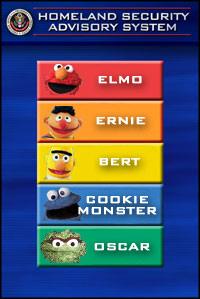
You see, my husband believes that all of my word motives are an attempt to be cutsie and flowery....and that it does not paint me in a very flattering light. "Be more serious and concise", he stresses. It is his opinion that the Sesame Street Terror Alert Widget is not appropriate because it pokes fun at something that should be taken very seriously. He reminds me that as a future DOS employee, I should be more respectful of the terror alert system.
Hmmph...Papa Bear is no fun at all! He is also the reason why I keep changing my sub-header. I have suggested that maybe he should get his own blog. For the record, I write what I want with the first words that enter my head in an attempt to be me. The exception is the word ruminations which I got from a thesaurus in my feverish attempt to define me in a short, concise phrase. It's awkward. I know. I do respect the Homeland Security Advisory System, but I am unable to live my life as a paranoid, suspicious person. IMHO the Sesame Street format softens the stressors created by the Terror Alert Levels, while reminding lurkers of the times we live in and the need to be vigilant.
As you can see it is no longer on my sidebar. Shall I put it back?
UPDATE: Ooooo...I was in the process of putting the Sesame Street Alert System back when I found this one at geek and proud: I think I'll try this one....that way I can veer away from the cutsie image into a more "is she becoming a geek?" persona.
I think I'll try this one....that way I can veer away from the cutsie image into a more "is she becoming a geek?" persona.
The ruminations of a lowcountry girl who, after traipsing around the South, finds herself at home in RVA (aka the frozen North of the South).
Wednesday, April 26, 2006
Terror on the Sidebar
Friday, April 21, 2006
The problem with the "The Digital Divide"
Obviously, the term "Digital Divide" was not a good term for me to use for this group. My friend advised me that according to digitaldivide.org, the core goal of the Digital Divide movement is to "give governments the infrastructure needed for the success of any large-scale effort to stop terrorism, disease or poverty. For another, it will make the global economy sustainable. Bringing another two billion citizens onto the information grid can return a sense of stability and fairness to markets".
I pushed my techy friend up on his soapbox so that I could better understand his issue with the use of the term "Digital Divide". Below is his response. To better understand his point of view, you should note that his wife is Asian. I told him I wanted to use excerpts, but I used almost all of it as I really did't know what to exclude!
Closing the so-called Digital Divide *could* be beneficial, but it also could be very detrimental; it just depends on how it is implemented and on how well that implementation takes hold.
On one level, it sounds promising, that everyone, including the poor, should have equal access to digital technology--wireless cellphones, computers in classrooms, and whatnot. Many people who work abroad will send money home to their families to purchase cellphones, and a lot of other electrical equipment to help make their lives 'easier'. The cellphones are nice, and I could quantify that as an exception to the rule, as it allow families to stay in touch more easily and cheaply.
But much of it is wasted or overlooked. Before we got married, my wife bought a cheap washing machine for her aging mother (about two or three months wages there), but it didn't clean the clothes as well as washing by hand, so now it's become an endtable. Computers also are quite popular, (to help the kids get ahead) but they sit unused as they don't know what to do with them, or don't have the software. Internet is out of the question, as you have to have a landline, and many areas only have cellphone coverage.
I think the single worst case that I've heard involved a small town a few hours away from my in-laws. Many of the residents there had children and/or sibling working abroad, who would send back money for all sorts of things. If you passed through the town, you could see that everyone had refrigerators, washers, dryers, TVs, stereos, computers--everything--neatly arranged on their front porches! The town hadn't yet gotten electricity, you see...
Many cities complain of overcrowding, so the government implemented an initiative to encourage people to stay in (or move back out to) rural areas. They would give them a plot of land, free of charge (perhaps 1/2 acre). But the city holds the promise of
higher income (and higher expenses, but they don't consider that), higher prestige (who wants to farm by hand?), and more educational opportunities (uh, if you have the money)--so they sell the land off for half it's value, travel to the city, move into a corrugated tin shanty, and spend the rest of the money on a cellphone, TV and dvd player. Then they can't find work, due to a lack of education, experience, and/or English speaking skills, so they end up begging, panhandling, or worse.
Another clear example of this is Somalia; they have a booming cellphone market, but it remains a miserable place to live.
But none of that really is a result of technology, or of the attempt to integrate technology; it's a money management and goal-setting issue.
This is an infrastructure and economic goal, not a "to every man" one. But the governments-in-place must be willing to allow these to be placed, and willing to maintain them and make them available to their citizens.
My soapbox is not about this goal, but those individuals who believe that the Digital Divide bypasses government and hands it straight into the hands of the most needy. It just doesn't work that way.
I guess this may be an unfair assumption on my part with regards to the Uplift Movement. It always seemed that their goal was to create a better world through living a better life themselves, which doesn't necessarily coincide with goals of governmental and economic expansion.
At this point I went back to my techy friend and explained that I didn't think the Uplifter movement was really trying to put a computer in every house so much as it wanted to assist people who are already interested in technology to not be afraid to learn about techology and to demonstrate how easily and cheaply it can be accessed. It also encourages people who are already techno geeks to share their knowledge.
"Here's the concept: Uplift is a national, non-profit, all-volunteer group devoted to helping regular people make use of free and low-cost technological tools. Uplifters support independent _expression, citizens’ media and Do-It-Yourself thinking. The group doesn't have a budget -- it has people."
My email conversation got me to thinking that maybe...just maybe...the term "Digital Divide" should NOT be used as a positive argument for the group. I went back to my techy friend to get permission to post his comments. My intent in approaching him was to stir a little chatter in the lowcountry blogosphere and maybe even get the press release revised for the sake of our virtual community.
My friend returned with still more comments worth sharing.
Based on what you are telling me about the article from the journalist, it seems like he merely appropriated the term from the global application and is instead using it as a sort of literacy tool locally.
That's kind of what I was hoping; the downside is that there are two very different concepts being attached to a common phrase. As far as your journalist associate is concerned, ["Digital Divide"] - that's something I do everyday--and believe everyone should be willing to do--I just never thought to equate it with that term.
I like this quote that you sent me separately:
> "Here's the concept: Uplift is a national,
> non-profit, all-volunteer group devoted to helping
> regular people make use of free and low-cost
> technological tools. Uplifters support independent
> expression, citizens’ media and Do-It-Yourself
> thinking. The group doesn't have a budget -- it has
> people."
The key words are "national", "regular people" and "free and low-cost technological tools". To me, that means regular and responsible use of ATMs, Debit cards, libraries, search engines, office machines, and other everyday items....not introducing new, expensive, or inappropriate equipment into their lives.
At my friend's suggestion, I will list the unexpanded version of Truths and Fallacies. First the Truths:
TRUTH NUMBER ONE: The Divide is widening, not narrowing, and at an ever-increasing rate.
TRUTH NUMBER TWO: Closing the Digital Divide may be the only way to make globalization work for the poor.
TRUTH NUMBER THREE: The consequence of not closing the Divide is terrorism.
TRUTH NUMBER FOUR: Closing the Digital Divide is fundamentally about empowerment, that is, it is about using new technologies to empower the poor just as they now empower the rich.
TRUTH NUMBER FIVE: Closing the Digital Divide is the only way to sustain the growth of world markets.
TRUTH NUMBER SIX: World leaders from every sector business, government, academia, NGOs can benefit from closing the Divide. Yet no one sector has the incentives to lead the effort to close the Divide.
TRUTH NUMBER SEVEN: Closing the Digital Divide requires building an "enterprise ecosystem" that offers "end to end solutions" for the poor.
TRUTH NUMBER EIGHT: The midlevel countries in relatively advanced emerging markets, not the poorest countries, are the best settings for experimental efforts to close the Digital Divide.
TRUTH NUMBER NINE: Closing the digital divide involves using new technologies to formalize the "informal economy," thereby bringing the poor into established markets.
Now for the Fallacies:
FALLACY NUMBER ONE: Closing the Digital Divide is about giving poor people access to computers.
FALLACY NUMBER TWO: Getting the private sector to profitably serve the poor at the "bottom of the pyramid" is the key to closing the Digital Divide.
FALLACY NUMBER THREE: Creating "shared use" of ICT products in the countryside, such as information kiosks that deliver government services, is the key to closing the Digital Divide.
FALLACY NUMBER FOUR: Closing the Digital Divide requires setting up a "superfund" that supports ICT projects for the poor.
FALLACY NUMBER FIVE: The key to closing the Digital Divide is investment in literacy and education.
FALLACY NUMBER SIX: Social entrepreneurs with IT skills must become the prime movers for closing the Divide since they are able to introduce "disruptive technologies" to serve the poor.
FALLACY NUMBER SEVEN: If governments will only open up their telecom sectors to foreign competition, and make themselves "e-ready", market forces all by themselves will cause the Divide to close.
There are explanations given for each Truth and Fallacy. I encourage you to read these and to consider how referring to the "Digital Divide" may stir an opposing view to the intent of the Uplifters Movement. FWIW, I do intend to be at the first drop in and will be dragging a few friends who are still thinking about blogging with me.
Wednesday, April 19, 2006
Who am I?
I work on the waterfront. (Gasp! Not one of those save the ports folks!) Yes, it's true. I work for a liner company...you may have seen a few of our boxes...they're the ones with the alligators on them. Occassionally, you'll even see Pablo back behind the wheel driving them around.
A few years ago I returned to school and just finished my MBA from the Citadel last August. My wonderful professors encouraged me to explore the world with my family in tow and they made me realize that even in my mid-30's with a family of four...I could still explore the world and make a difference. A difference? Like what, you ask? You know, that stuff you dreamed about as a teenager, but never really get around to doing. Well, I am about to do it. On April 8th, I took the FSWE for the 3rd time. (That's the Foreign Service Written Exam for those of you not in the know.) I did pass last year, but then bombed the Oral Assessment. Don't worry though, I have lots of pots on the burner. I did pass the OMS Assessment (Foreign Service Office Management Specialist...it's no wonder those who know prefer acronyms!) and was offered a position in the March and then the May class. I have declined both offers all because I THINK I am pending an interview for the GSO position. (That's a Foreign Service General Services Officer, BTW). Oh, I am also a little active in the FS Yahoo Group community. Maybe a little active is a vague term since most of my spare time is spent hanging out with this community.
I felt the need to clarify who I am for my husband's sake (aka "Papa Bear"). He thought the description at Postscripts sounded like I was a bored housewife. It is HE that is the househusband. He spends his free time at ebay in an attempt to rebuild his old bicycle frame with a bunch of campy parts....and he loves a particular seller called The Sultan of Schwag. I had told him to rebuild the frame or it had to go because I was not going to cart a frame all over the world.....and it has been only a frame for the past 14 years that I have known him. So imagine his surprise when I discovered that Postscripts had discovered me and that Dave Moulton was also in the mix. Hubby immediately turns off the History Channel and made me repeat that Dave Moulton LIVES in Charleston. It blew him away....and he now wants to go out for a few cocktails to discuss writing with him....SHEESH!!!
OK...there ya go. A little more info to flush me out...since I really don't think you had a handle on my name before this....unless you intended to look up "the kid's" race number...you wouldn't do that, would you? ;)
Sunday, April 16, 2006
My Grandfather, "Peanut" in WWII
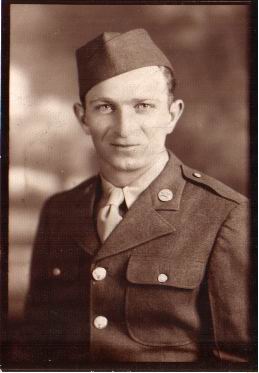
This is my Grandfather, Donald Satterfield. He was nicknamed "Peanut" because when he was a child he saved his pennies for the peanut machines in town. Pappa was drafted into the Army in 1943...double hernia and all. Once in, he was operated on and put to work in a mess hall for light duty while recooperating. The officers liked his cooking so much that they only wanted him to prepare his meals, so he was made Mess Sergeant. I know he did see some combat and drove trucks, too. I realize that it is just vague enough in my mind, that I will now request his service record.
Grandpa's sisters, Bettie and Dorothy, also served in World War II. Here they are in their seersucker uniforms. On the back of the picture it says "Bettie
Brice in WWII
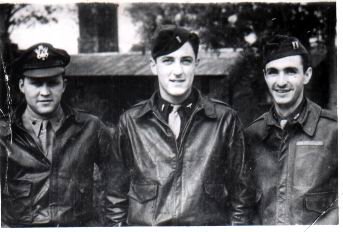
From L-R is Brice, Lt. McCarthey and Capt Rubino. On the Back of the photo it says that this is the day Rubino refused to fly after the airplane had 27 holes shot in it. Brice was made the pilot (Crew Commander). It was the end of May 1944 - just before D-Day.
On November 26th 1944, Brice's Plane "The Unlimited" was shot down and he became a POW. The previous 26 missions he was the pilot, but on this day he was the co-pilot so that a new pilot could run through an orientation flight. In his words "Everything was normal until we were in the target area. Over the target, flack was heavy. I saw 200 or 300+ fighters milling around outside of the target area. To avoid the flack after bombs away over the target, we turned to get out of the flack. Immediately the Me-109’s attacked the formation. The formation was attacked by 6 x 109s abreast with several flights of 6 abreast. The aircraft was a blazing inferno within 3 or 4 seconds. I looked back in the bomb bay and saw a crewman in a complete fireball. I got up from the seat to try to extinguish him. As I got up I glanced out of my side window and saw the right wing with #3 and #4 engines still attached…break off. The aircraft went into a wild gyration and there was a loud explosion. I was blown clear of the aircraft in the cool temp. (-50 degrees or more)"
What was not mentioned here is that prior to being blown from the plane, Brice was pulling down a crew member from the top turret because he knew the gunner did not have a parachute on due to the tight space up there.
Continuing on..."I delayed pulling the ripcord because I was fastening the parachute leg straps. (It was uncomfortable to sit in the seat for 8+ hours with the straps fastened.) While falling, I fell through a group of fighters firing at each other. Then I saw people on the ground and I pulled the ripcord. I landed in a freshly plowed, soft field. I rolled in the mud to try to extinguish the fire on myself. My clothes were on fire and my oxygen mask had melted onto my face. I was the first on the ground from the battle. I saw many men in parachutes descending from the air battle. Many aircraft were on fire and pieces were falling all around me. I saw many parachutes catch on fire and disappear from falling aircraft parts. They had no parachute left."
"Within a few minutes, there were several German soldiers with rifles and bayonets against my stomach. They were hollering “Pistol.” An 8-10 year old kid appeared and acted as interpreter. The boy spoke good English. I was ordered to get my parachute and go with them. About this time, someone hanging from a parachute above me started yelling at these German soldiers. He was a German fighter pilot who was shot down in the battle. He also spoke good English and asked me for a cigarette. I gave him the cigarettes I had and we walked side-by-side discussing the battle that was still going on about us. He put me in a room of a small building, shook my hand and disappeared. I never saw him again.
A man came into the room and said he was a doctor. He saw that I was pretty well burned and he put some kind of grease all over my face and arms. Then he wrapped my face, neck, wrists, etc. with a stretch type bandage.
Darkness descended upon us and I with about 4 other Americans who I did not know were taken by some kind of truck to a type of prison. I was place alone in a concrete room. I was kept there for a couple of days without food or water. Then I was moved along with 10-15 other Americans. One of them was my navigator, McCarthy. We rode the train for a day or two to a railroad station where we waited. While at this railroad station, the Brits started bombing it. We were rushed out and got on a trolley car out of the railroad station. We rode this trolley for a mile or two. We were then taken off of the trolley and taken to an interrogation center. The German officer interrogating me kept asking me...my name. After about 30 minutes of this, I told him that I had always thought of the German people as being humane and I needed to see a doctor for my face where I had been burned. He said, “I’ll show you how humane the Germans are.” He called someone on the phone and told me a staff car would pick me up and take me to a hospital. Immediately 2 people came in and escorted me to a waiting staff car.....I was taken along with 15-20 Americans to a German hospital (It was something like Monetcen or Obermasfelt) where the medical division of the 1st British Airborne (which had been captured at Arnham) was taking care of the medical needs for the Allied POWs. After 4-5 weeks treatment at this hospital, I was transferred to a regular POW camp and was moved around 3 or 4 times until the war was over. "
When he was liberated from the POW camp, this 5'8" man weighed under 100 lbs thanks to a diet of burnt toast and water. However, he contends that at no time was he ever mistreated.
Tuesday, April 11, 2006
The World War II Memorial
I need to add that when John was nine years old, he lived in Nazi-occupied Holland. On November 26, 1944 a B-17 crashed behind his house. This was the same day that Brice was shot down in his B-24. The firsthand accounts of WWII that John witnessed at so young an age is horrifying and incredible to me. I can only imagine the things he has seen that are now etched in his memory.
The Memorial Plaza (Photo by Richard Latoff)
Papa Bear and I did visit the WWII Memorial in Washington DC last September when I made it through my first FSOA attempt. My mind was on other things, so I didn't take any pictures. Luckily, you can access photos and enter your own soldiers in the register here. I intend to enter my grandfather and my great aunt Lucille this weekend. I will also add a few photos of my WWII family members over the next few days.
Sunday, April 02, 2006
29th Cooper River Bridge 10K
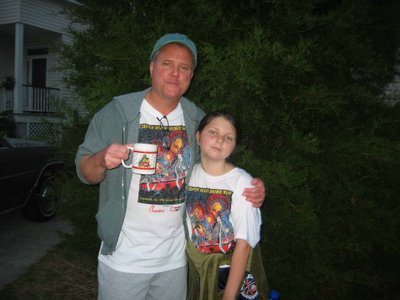
USA Track and Field altered the course this year because Charleston built a new bridge and a huge turnout was expected for the historic first run over it. In the past walkers only had to leg a 7K course, but this year they were forced to walk the entire course. This came as a big surprise to past walkers who couldn't figure out why the walk seemed so long. Interesting that with 45497 entrants, only 33742 crossed the finish line. It appears that no one was really forced to walk the entire course.
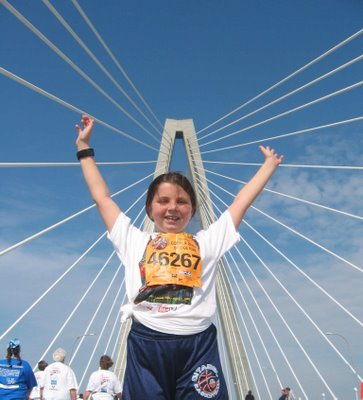
Hooray...the half way point! Luckily, the course literally went down hill after that.
Centerburg, Ohio- Feb. 22, 1919.
Centerburg, Ohio Feb. 22, 1919 Dear Uncle, I received your letter today. Mr. Van Sickle gave it to me this morning. Grandma gave it...
-
Lately, I find myself looking through blogs for interesting sidebar widgets. I feel a great need to break up the monotony going on over ther...
-
Reporting from Secaucus, NJ....everything is anything but sane! I am attending a hazmat training seminar and things have taken quite an inte...
-
The family and I took a trip to Banner Elk, NC to visit Poppie and T'ai T'ai who live part of every year on Sugar Mountain . Banner ...
